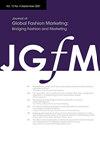The effects of political ideology and brand familiarity on conspicuous consumption of fashion products
IF 5.5
Q2 BUSINESS
引用次数: 3
Abstract
ABSTRACT From the lens of conspicuous consumption, this research examines the interactive effect of brand logo size and political ideology on consumers’ intentions toward fashion products. Specifically, in a series of four studies, we address how consumer political ideology influences intentions toward items displaying smaller, inconspicuous logos versus larger, conspicuous logos for unfamiliar and familiar brands. We show that liberal consumers are more likely to prefer a large (rather than small) logo when a brand is unfamiliar. We suggest that liberals’ greater desire for product uniqueness elevates their risk propensity, which in turn increases preference for conspicuous consumption when familiarity with a brand is low. We show that this effect occurs only for unfamiliar brands; when brand familiarity is high (i.e. a popular or well-known brand), consumer political ideology reverses consumer preference for conspicuous consumption, replicating prior work. Our results suggest that, by manipulating their logo size, new brands may effectively target consumers based on their political ideology.政治意识形态与品牌熟悉度对时尚产品炫耀性消费的影响
摘要本研究以炫耀性消费为视角,考察了品牌标识尺寸与政治意识形态对消费者时尚产品意向的互动效应。具体而言,在一系列四项研究中,我们探讨了消费者政治意识形态如何影响对展示较小、不显眼标志的商品的意图,而对陌生和熟悉品牌的较大、显眼标志的意图。我们发现,当一个品牌不熟悉时,自由派消费者更喜欢大(而不是小)的标志。我们认为,自由主义者对产品独特性的更大渴望提高了他们的风险倾向,这反过来又增加了他们在对品牌熟悉度较低时对炫耀性消费的偏好。我们发现,这种效应只发生在不熟悉的品牌身上;当品牌熟悉度较高(即流行或知名品牌)时,消费者政治意识形态会逆转消费者对炫耀性消费的偏好,复制先前的工作。我们的研究结果表明,通过操纵其标志尺寸,新品牌可能会根据其政治意识形态有效地瞄准消费者。
本文章由计算机程序翻译,如有差异,请以英文原文为准。
求助全文
约1分钟内获得全文
求助全文
来源期刊

Journal of Global Fashion Marketing
BUSINESS-
CiteScore
6.90
自引率
31.60%
发文量
34
期刊介绍:
The Journal of Global Fashion Marketing is a quarterly journal that publishes peer-reviewed conceptual and empirical papers and business cases of original works that significantly contribute to the overall advancement of marketing theory, research, and practice in fashion, design, and culture. JGFM endeavors to be a “global bridge” connecting marketing scholars and practitioners in fashion, design, and culture throughout the world. We publish high-quality scholarly articles on marketing written by contributors representing the leading academic authors. As we state on the cover of every issue, our positioning statement, our value added to the marketing scholar readership, is truly to “Bridge Fashion and Marketing” 1. Monitor and analyze global fashion marketing trends. 2. Generate and integrate new ideas and theories related to fashion, luxury, and culture marketing theory and practice. 3. Apply new research methods and techniques in fashion, luxury, and culture marketing. 4. Explore and disseminate cutting edge fashion marketing practices. JGFM welcomes manuscripts that provide fresh, innovative insight to any topic in the field of fashion, luxury, and culture marketing. Both conceptual and empirical works are valued, so long as the manuscript addresses substantive issues in marketing.
 求助内容:
求助内容: 应助结果提醒方式:
应助结果提醒方式:


